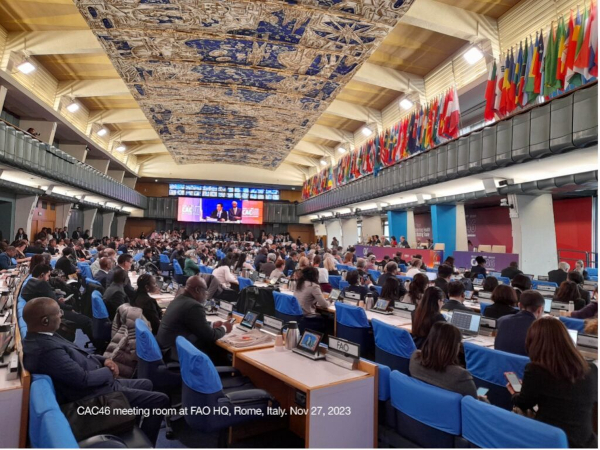Originally published on: December 4th 2023
.jpg)
Originally published on www.thenhf.com
After having waged a many-years-long battle around the Globe against the toxic vet drug zilpaterol hydrochloride at both the Codex Alimentarius Commission and committee levels (2016, 2018, 2021, 2022), the National Health Federation (NHF) finally reached the end of the road today when over NHF’s and many Codex member states’ objections, the Commission voted 88-49, with 11 abstentions, in favor of adopting the toxic-drug standard. It took all of Tuesday afternoon, at the FAO headquarters in Rome, Italy, to reach a conclusion.
Remember that zilpaterol is Merck’s special steroid-like veterinary drug for cattle, pigs, and poultry, which unnaturally pushes them to make more muscle and less fat. It harms the animals who get it, and it harms the humans who then eat them. There is no therapeutic benefit whatsoever to the poor animals, only financial benefit to the vet-drug companies and ranchers.
And, yet, intense arguments were made by the zilpaterol proponents at this meeting when they pleaded with the Committee to push the Codex standard from Step 7 up to the final Step 8 in the 8-step approval process at Codex just so that Merck and others could make more dollars around the World. With such passion, you would have thought they were trying to save lives; but, no, it was only about the money.
Why is the zilpaterol standard at Codex so important? Once this zilpaterol Codex standard is adopted, then zilpaterol can flood the World markets unobstructed. Merck could then force the European Union, Russia, China, Switzerland, Norway, and all those other countries who voted against it to open their markets to zilpaterol-tainted meat as well. And Merck would only be richer.

The Chairman of the Commission, Mr. Steve Wearne – who, by the way, has a real talent for running meetings – quickly had the Commission members focused upon two issues: (1) advancing (or not advancing) the zilpaterol standard from Step 7 to Step 8; and (2) once that threshold was reached, or breached, then final adoption at the very final Step 8. I know it sounds repetitive, but that is how Codex thinks, and works.
But first the Chairman wanted to establish with the Commission members that the JECFA risk assessment on zilpaterol was supreme. He asked the members to accept that the “science” was solid. No one said a word … except for NHF.
I asked for the floor and told everyone that, with all due respect to JECFA, NHF had always had a problem with the risk assessments conducted on the vet drug and did not accept them as valid. Encouraged by our lone attack on JECFA science, Thailand then took the floor to state that it, too, had concerns. The other delegations remained mute.
Nonplussed, the Chairman pushed on with his agenda. “Are there any objections,” he asked, “to advancing the [zilpaterol] MRLs [maximum residue levels] to Step 8?”
Many member states spoke out both For and Against zilpaterol. I will skip over the elaborate maneuvers that were initially undertaken by the anti-zilpaterol forces to avoid a vote altogether on the standard, but speaking against the standard were the European Union, Switzerland, Norway, Russia, Kazakhstan, Turkey, China, Thailand, Saudi Arabia, Qatar, Iran, Iraq, UAE, Algeria, Belarus, Syria, Tunisia, North Macedonia, and Cameroon. Those pushing the standard were the United States, Canada, New Zealand, many African states, and every single one of the Western-hemisphere countries. The UK remained strangely aloof, as if wishing to avoid offending anyone.
NHF and IBFAN (the International Baby Food Action Network) were the only two INGOs to speak against adoption of the zilpaterol standard. IBFAN expressed its strong opposition first, and then NHF was called upon to speak, as the very last speaker on the subject before a decision was to be made.
What I roughly said on the zilpaterol issue just before 5:00 p.m. local time has been set down below from memory:
“Our thanks to those who want to protect consumers, such as Saudi Arabia, Qatar, Iran, UAE, China, the EU, Norway, Russia, Turkey, and others. On the safety issue it’s important to know that no risk assessment has been done per the Codex Procedural Manual, which very clearly states that, the ‘Risk assessment should be based on realistic exposure scenarios.’ This means that risk assessments should have been done on zilpaterol’s synergistic effects with the other toxins, endocrine disruptors, and chemicals that we are directly exposed to in the real world. This was never done. And we know zilpaterol is not safe, otherwise why is it banned for use in horses and why was it withdrawn from the market by the manufacturer in 2015?
“But whether you believe that non-therapeutic zilpaterol is safe or not safe is irrelevant here. This is not a product that will add to the safety of our food supply. It will not make any one person or any animal one bit healthier. What zilpaterol does is to help increase the profits of a $262-billion drug company. Is that what you want your legacy to be here?
“Please reject any zilpaterol standard, not because you are rejecting a JECFA assessment on safety but because you refuse to allow any drug into our worldwide food supply that does not make our food or our animals any healthier but simply makes more money for a fat-cat company. They don’t need the extra money.“
As I said, I was the last one to speak on the subject, but I was interrupted and chastised by the Chairman for my use of the correct depiction of a $262-billion mega-corporation as a “fat-cat company.” I defended my statement to the Chairman as one of fact and not intended to impugn anyone or anything. If a $262-billion company is not a “fat-cat company,” then I don’t know what is. Some might even consider it a compliment. And the need for any amount of zilpaterol added to animal feed still remains zero!
Regardless, two votes were taken, and the anti-zilpaterol delegations lost both times. The United States and the industry front group Health for Animals had almost certainly lined up their votes long before the meeting as almost every postage-stamp-sized country from around the Globe was present to vote. So, in the Codex voting scheme, little Grenada’s one vote counts the same as enormous China’s or India’s single votes. Tellingly, throughout the debate, the leaders of the pro-zilpaterol forces seemed smugly confident of victory. And rightly so, as it turned out.
Now they can turn their attention to spreading yet another toxic drug across the face of the Earth. Still, NHF and others held them back for many years, probably costing the manufacturer millions of dollars from the delay while protecting consumers.
Zilpaterol is already in use in most of those countries that argued in favor of a Codex standard for it, which includes the entire Western Hemisphere from Canada all the way down to Argentina and Chile. However, New Zealand, Uganda, Bangladesh, and Senegal – all of whom hypocritically argued for a worldwide Codex standard for zilpaterol – prohibit its use in their own countries, demonstrating once again that these Codex offices are rogue agencies that answer not to their own governments or citizens but to their Big Pharma and Big Ag handlers.
As a footnote, let me say that I was pleased that several delegates came up to me after my speech to thank me for having said what many delegates there thought but could not say themselves. Two people even described it as the best speech made on any topic during the entire Codex meeting.
Thanks again to all of our NHF members and supporters who helped make this participation in the Codex meeting possible! For those who wish to support our work, we gratefully accept donations at https://thenhf.com/join-us/make-a-donation/.
Scott Tips, JD is a California-licensed attorney, legal columnist and president and general counsel for the National Health Federation. He specializes in food-and-drug law and trademark law, but also engages in business litigation, general business law, and nonprofit organizations, with an international clientele.
© December 4th 2023 GreenMedInfo LLC. This work is reproduced and distributed with the permission of GreenMedInfo LLC. Want to learn more from GreenMedInfo? Sign up for the newsletter here https://www.greenmedinfo.com/greenmed/newsletter.
Source: Original Article
Originally published on: December 4th 2023

